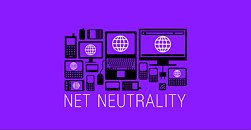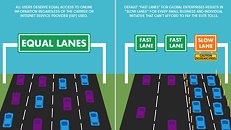Raevenlord
News Editor
- Joined
- Aug 12, 2016
- Messages
- 3,755 (1.16/day)
- Location
- Portugal
| System Name | The Ryzening |
|---|---|
| Processor | AMD Ryzen 9 5900X |
| Motherboard | MSI X570 MAG TOMAHAWK |
| Cooling | Lian Li Galahad 360mm AIO |
| Memory | 32 GB G.Skill Trident Z F4-3733 (4x 8 GB) |
| Video Card(s) | Gigabyte RTX 3070 Ti |
| Storage | Boot: Transcend MTE220S 2TB, Kintson A2000 1TB, Seagate Firewolf Pro 14 TB |
| Display(s) | Acer Nitro VG270UP (1440p 144 Hz IPS) |
| Case | Lian Li O11DX Dynamic White |
| Audio Device(s) | iFi Audio Zen DAC |
| Power Supply | Seasonic Focus+ 750 W |
| Mouse | Cooler Master Masterkeys Lite L |
| Keyboard | Cooler Master Masterkeys Lite L |
| Software | Windows 10 x64 |
The Entertainment Software Association (ESA) has gone to court to fight against the FCC's plan at averting net neutrality. This is a deep, important issue that's seen rivers of ink flow already; but this take from the association that represents companies such as Sony, Nintendo, Microsoft, Bethesda, Capcom, Disney, EA, Epic Games, Konami, Magic Leap, Nvidia, Ubisoft, Square Enix, and Warner Bros. comes out to show the impacts that the end of net neutrality could bring about for gamers.
The concerns put forward stand at various levels: one, internet speed throttling could end up giving players negative experiences in connected gaming scenarios (and most games nowadays employ - or try to employ - some sort of online portion as it is). Two, online gaming, by its very nature, sees what could be some solutions to the problem that can be used by other services (such as buffering) unavailable to it. Moreover, the ESA refers the court to troubles in digital game distribution (as ISPs could throttle time and data-consuming digital game downloads.



On their brief, filed in the US Court of Appeals for the District of Columbia Circuit, the ESA says that "The FCC's Order eliminates the rules that prevent broadband providers from blocking, throttling, and otherwise interfering with consumers' access to content online. Absent these protections, ESA and its member companies will have no effective legal recourse against broadband provider conduct that impairs consumers' online video game experiences. In particular, broadband providers are now permitted to engage in practices that degrade consumers' traffic. That, in turn, could have significant consequences for the enjoyment of multiplayer online games and cloud-based game play services, both of which require low-latency connections to support rapid and continuous interactivity."
View at TechPowerUp Main Site
The concerns put forward stand at various levels: one, internet speed throttling could end up giving players negative experiences in connected gaming scenarios (and most games nowadays employ - or try to employ - some sort of online portion as it is). Two, online gaming, by its very nature, sees what could be some solutions to the problem that can be used by other services (such as buffering) unavailable to it. Moreover, the ESA refers the court to troubles in digital game distribution (as ISPs could throttle time and data-consuming digital game downloads.



On their brief, filed in the US Court of Appeals for the District of Columbia Circuit, the ESA says that "The FCC's Order eliminates the rules that prevent broadband providers from blocking, throttling, and otherwise interfering with consumers' access to content online. Absent these protections, ESA and its member companies will have no effective legal recourse against broadband provider conduct that impairs consumers' online video game experiences. In particular, broadband providers are now permitted to engage in practices that degrade consumers' traffic. That, in turn, could have significant consequences for the enjoyment of multiplayer online games and cloud-based game play services, both of which require low-latency connections to support rapid and continuous interactivity."
View at TechPowerUp Main Site


